April 13th Scots Book of Days
April 13 862 Donald I died Dòmhnall mac Ailpein. son of Alpin king of Dal Riata, and brother of Kenneth I. Succeeded by Constantine I (Còiseam mac Choinnich) died 877. Succeeded by Áed (Aodh mac Choinnich) died 878. Succeeded by Giric (Griogair mac Dhunghail) died 889, and Eochaid, then Donald II (Dòmhnall mac Chòiseim) to 900.
 Kenneth I (Coinneach mac Ailpein) “The Conqueror’,
Kenneth I (Coinneach mac Ailpein) “The Conqueror’,
 Nicholas West “The Wine-Bountiful’
Nicholas West “The Wine-Bountiful’
 Donald II the “Madman” or “Psycho”
Donald II the “Madman” or “Psycho”
1513 The English ambassador, Nicholas West described the preparation of the fleet on 13 April 1513;
“On Monday because I had no business, for a pastime I went down to Leith to th’entent to see what shyps were prepared ther, and when I came ther I found none but 9 or 10 small topmen, amongst whom the ship of Lynne was the biggest, and other small balyngiers and crayers, and never one of all these was rigged to the war, but one little topman of the burden of three-score tonne.’’
http://dictionary.sensagent.com/royal+scots+navy/en-en/
Leith is the port for Edinburgh on the South bank of the firth of forth flowing into the North sea. In 1560 it will be the site of the Siege of Leith, a major battle of the Protestant Reformation and end of the auld alliance between Scotland and France, beginning a new alliance with England.
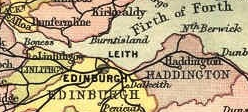 Tytler’s History of Scotland from Encyclopaedia Britannica 157
Tytler’s History of Scotland from Encyclopaedia Britannica 157
CHRONOLOGY OF THE PERIOD.
1564 A.D. Sometime this year. Siege of Malta by the Turk.
1564 A.D. Sometime this year. Michael Angelo obit.
1568 A.D. Sometime this year. Revolt of the Netherlands from Philip II.
1584 RUTHVEN, WILLIAM, fourth Lord Ruthven and first Earl of Gowrie (1541?–1584), Provost and Lieutenant of Perth, Lord High Treasurer, came to Dundee on the pretence of intending to take ship there, but in reality to be in readiness to concert measures with the other conspirators. on 13 April Colonel Stewart was sent by sea to Dundee with one hundred men, charged by a royal warrant, written by Arran, to bring Gowrie to Edinburgh.
1534 to 1607 to 1641 circa. The Act of Uniformity, the Test Acts and Penal Laws of England, Ireland and Scotland were, according to Edmund Burke “a machine of wise and elaborate contrivance, as well fitted for the oppression, impoverishment and degradation of a people, and the debasement in them of human nature itself, as ever proceeded from the perverted ingenuity of man.” Savage, John (1869). Fenian Heroes and Martyrs. Patrick Donahoe. pp. 16. Bans on Catholics, Dissenters from the Established Church Presbyterians, Ban on converting from Protestantism to Roman Catholicism on pain of Praemunire: forfeiting all property estates and legacy to the monarch of the time and remaining in prison at the monarch’s pleasure. In addition, forfeiting the monarch’s protection. No injury however atrocious against the offending person, to wit arson, theft, assault, murder, ejectment, could have any legal action brought against it, or any reparation for such. (i.e. the Sheriff would not enforce any complaint for arrest, no judge would order any protection). Wikipedia. repealed circa 1829.
- Robert Bruce, minister, hosted king James 6th. Bruce was sent to the king [James 6th] then sitting with the lords in session, to present some articles for redress of the wrongs then done to the church; but, in the mean time, a bustle falling out at Edinburgh by the mob, Bruce removed to Linlithgow. Upon the Sabbath following, Mr. Bruce preaching upon the 51st psalm said,
“The removal of your ministers is at hand, our lives shall be bitterly fought after, but ye shall see with your eyes, that God shall guard us, and be our buckler and defense &c.” and the day following, this was in part accomplished, for the king [James 6th] sent a charge from Linlithgow to Mr. (then abbreviation for Minister, pronounced Mister) Bruce and the rest of the ministers of Edinburgh, to enter in ward at the castle there within six hours after the proclamation, under pain of horning. The rest of the ministers, knowing the king’s [James 6th] anger was kindled against them, thought proper to withdraw, but Mr. Bruce knowing his own innocency, stayed, and gave in an apology for himself and the rest of his faithful brethren. In April 13th 1599, the king [James 6th] returned to Edinburgh, and was entertained in the house of Mr. Bruce, although he [Bruce]himself was not yet released. But all this was nothing more than the drops before the shower, or as the gathering of waters before an inundation breaks forth, [within 18 months] for the king, [James 6th] having for some time laboured to get prelacy established in Scotland, and because Mr. Bruce would not comply with his measures, and refused to give praise to God in public for the kings [James 6th] deliverance from the pretended conspiracy in the year 1600, [Gowrie’s assassination by King James’ attendants] until he [Bruce] was better ascertained of the fact, he [James 6th] not only discharged him [Bruce] from preaching in Edinburgh, but also obliged him [Bruce] to leave the kingdom. Biographia Scoticana: OR, A BRIEF HISTORICAL ACCOUNT OF THE LIVES, CHARACTERS, and MEMORABLE TRANSACTIONS of the most eminent SCOTS WORTHIES, Noblemen, Gentlemen, Ministers, and others: From Mr. Patrick Hamilton, who was born about the year of our Lord 1503, and suffered martyrdom at St. Andrews, Feb. 1527, to Mr. James Renwick, who was executed in the Grass-market of Edinburgh Feb. 17, 1688. together with a succinct Account of the Lives of other seven eminent Divines, and Sir Robert Hamilton of Preston, who died about, or shortly after the Revolution. as also, An Appendix, containing a short historical Hint of the wicked Lives and miserable Deaths of some of the most remarkable apostates and bluidy persecutors in Scotland from the Reformation to the Revolution. Collected from historical Records, Biographical Accounts, and other authenticated Writings:—The whole including a Period of near Two Hundred Years. By John Howie – 178181
Definitions. Letters of horning denounced a person as a rebel. Reading the document in the public square was accompanied by three blasts of a horn (originally horns were just that, horns, made by cutting off the horn of a bull or cow, which horn is naturally hollow – then cutting the tip to make a tunnel from the open small end to large end, Then putting the tip to the lips, and buzzing the lips while blowing into the small tip end, to make sounds.) A person put to the horn could be imprisoned, and all property confiscated. Letters of horning ceased by the Debtors Scotland Act of 1987.
Prelacy is the government of the Christian Church by professional clerks of high social rank such as Bishops, in the Episcopal Church, abbots, superiors. Sometimes Disparaging.
1640 first meeting of the Short Parliament.
The Bishops War – 1639 to 1640. Charles marches a make-shift army north. The Covenanter army seizes Newcastle cutting supplies of coal to London. Charles is forced to negotiate with the Scots and agrees to pay their large expenses. To finance the settlement he is forced to call his first Parliament in eleven years. Video: The Sword and the Cross: Covenant or King.
http://www.bbc.co.uk/scotland/history/covenanters/the_bishops_war/
1646 Siege of Exeter ended with the surrender of Royalist garrison.
1657 – Oliver Cromwell declines the crown of England.
1719 George Keith, 10th Earl Marischal infiltrates Scotland with 300 Spanish marines to raise the Western clans. On 13 April 1719, Keith’s men disembarked on the Highlands near Lochalsh, although the Highlanders did not join the “Little Rising” in the expected numbers (the Spaniards carried 2000 guns to distribute), mistrusting the enterprise and waiting for news from the south. Keith could not proceed to Inverness and established his headquarter in the castle of Eilean Donan. Giulio Alberoni decided to meddle in the throne disputes, supporting the Jacobite claims.
 Eilean Donan Castle. The island’s first castle was an early 13th -century fortification against raiding Vikings, and it’s been sacked and rebuilt several times.
Eilean Donan Castle. The island’s first castle was an early 13th -century fortification against raiding Vikings, and it’s been sacked and rebuilt several times.
travel.nationalgeographic.com/travel/countries/scotland-photos/
Keith Crest: Out of a crest coronet Or, a roebuck’s head Proper, attired Or. Motto: VERITAS VINCIT. [from Latin: “Truth conquers”]. Chief: James William Falconer Keith, 14th Earl of Kintore Seat: Keith Hall, Aberdeenshire
Keith of Dunnottarin Kincardine 1109 2Stewart2Campbell 2Montgomery2Blair 2Cochrane2Miller 2Simmons2Choate Zoë Blair5
1743 – Thomas Jefferson, born, American politician; 1st United States Secretary of State, 2nd Vice President of the United States & 3rd President of the United States (d. 1826).
1775 Middlesex County Massachusetts. Gun control by the English who have a secret plan to disarm the colonials, by confiscating the Colonials personal pistols and muskets. It is not about crime, but power. When Governor Thomas Gage dissolved the provincial assembly, in October 1774 Patriot leaders responded by setting up an alternative government that actually controlled everything outside Boston. Across the ocean from Scotland, hundreds of thousands of Scots and their descendants are scattered 2,000 miles up and down the Atlantic coast of the colonies, many having been forced by the Highland Clearances after the ’45 (1745 Jacobite uprising).. The English military watch the colonial arms, particularly those at Lexington and Concord. Gun control will cause the spark for the American Revolution.
1779 Catherine Hamilton (d 13.04.1779, daughter of Basil Hamilton of Baldoon) m. (10.1727) Thomas Cochrane, 6th Earl of Dundonald (b 1702, d 28.05.1737).
[Hamilton 2Stewart 2Millar 2simmons 2Choate 2Sorensen]
- Basque Roads. on 13 April, the other ships returned to Lord Gambier’s position offshore, and Cochrane ignored repeated orders from Gambier to also disengage. Cochrane instead destroyed more French vessels before finally obeying Gambier’s signals, and the battle ended.
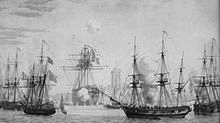 The Régulus stranded in the mud in front of Fouras under attack by British ships, April 1809. The Régulus managed to resist for 2 weeks, and finally returned to the harbour of Rochefort on 29 April, after the departure of the British fleet in the night of the 25–26 April
The Régulus stranded in the mud in front of Fouras under attack by British ships, April 1809. The Régulus managed to resist for 2 weeks, and finally returned to the harbour of Rochefort on 29 April, after the departure of the British fleet in the night of the 25–26 April
1829 Great Britain Royal assent to Roman catholic emancipation, which was approved by parliament, to avoid civil war in Ireland. The civil distinctions included being banned from giving testimony in court, banned from serving as jurors, denied commissions as officers, denied appointments as faculty in the universities, banned from serving as officers of corporations, denied voting, restricted travel, refused passports or visas, no ownership of religious property, denied recognition of marriage, denied taking and giving oaths. The laws applied to all non Anglican officers, including dissenters such as Presbyterians, Methodists, Quakers, Baptists, Congregationalists, Jews, Hindoos, etc. The laws were enforced irregularly since 1534. This repeal opened Great Britain to lawful proselyting. Tytler’s history of Scotland from Britannica.
1830 Joseph Smith the Prophet, at Manchester, New York, (clan Mack of Inverness, Malcolm King of Scots), Doctrine and Covenants 22. Some days in April. Wherefore, although a man should be baptized an hundred times it availeth him nothing, for ye cannot enter in at the strait gate by the law of Moses, neither by your dead works.
1861 – American Civil War: Fort Sumter surrenders to Confederate forces.
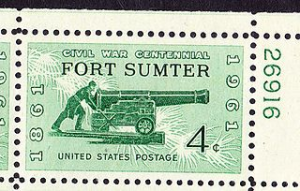 A 1961 Civil War Centennial postage stamp depicts a cannon and its gunner. The cross of St Andrews used by the Confederacy.
A 1961 Civil War Centennial postage stamp depicts a cannon and its gunner. The cross of St Andrews used by the Confederacy.
1880 – Robert Fortune, Scottish botanist died, (b. 1813)
1873 Carlo Coccia (14 April 1782 – 13 April 1873) was an Italian opera composer. Professor Alexander Weatherson in the 2009 Donizetti Society Newsletter wrote.
Scotland’s soil was about to be profaned by a stream of operas that bore the footprint of [Elizabeth’s] rival……without Mary Stuart, Scotland might have been left in peace….In Italy alone in the earliest decades of the nineteenth century there was a Scotch broth of operas. Wikipedia
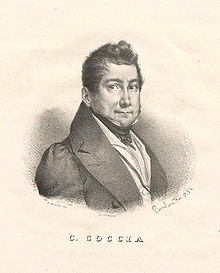 In 1827, he wrote Maria Stuarda for Giuditta Pasta, which, despite her and the celebrated bass Luigi Lablache being in the cast, was not successful, achieving only four performances.
In 1827, he wrote Maria Stuarda for Giuditta Pasta, which, despite her and the celebrated bass Luigi Lablache being in the cast, was not successful, achieving only four performances.
1892 – Sir Robert Alexander Watson-Watt, born, Scottish inventor (d. 1973)
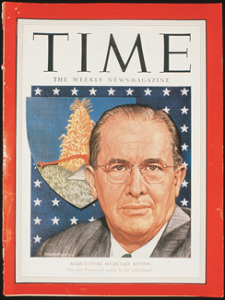 1953 Time Magazine Cover featuring Secretary of Agriculture Ezra Taft Benson (clans Boyd, Wilson)
1953 Time Magazine Cover featuring Secretary of Agriculture Ezra Taft Benson (clans Boyd, Wilson)
1955 Public Health newspaper headlines.
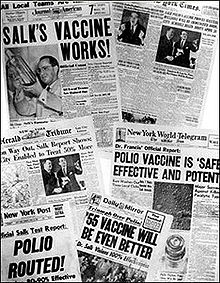 Polio vaccine tests approved. W hich is the lead into the Yale School of Public Health Coat of Arms.
Polio vaccine tests approved. W hich is the lead into the Yale School of Public Health Coat of Arms.
The Yale School of Medicine arms. These are the arms of Elihu Yale, the East India merchant and benefactor after whom Yale College is named. Note the Cross of Saint Andrews, from the Scottish flag. (white for Scots sinc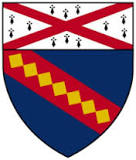 e 1385, red for St. Patrick).
e 1385, red for St. Patrick).
2011 The Fighting Cochranes continue the tradition.(clan Cochrane, Colonel Hugh Cochrane of Ayrshire flourished 1635, brother of William the Earl of Dundonald.) Friday. More than two decades ago, Private Mark Choate became a medic in the U.S. Army. On Wednesday, Major Choate was honored with a Bronze Star medal for his meritorious service as a historian the previous six months in Afghanistan.
Choate, teaches history at Brigham Young University, and traveled throughout Afghanistan interviewing special operations forces in the U.S. military and other coalition forces and cataloguing the work they were doing to mentor rural Afghan governments and training forces and to support rural development. “Major Choate’s dedication to duty during combat operations in Afghanistan contributed greatly to the command’s overwhelming success,” the citation accompanying the award read. “His actions are in keeping with the finest traditions of military service.”
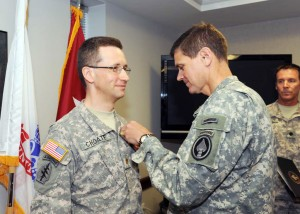 Major Mark Choate, an United States Special Operations Command historian, was presented with a Bronze Star medal by Maj. Gen. Joseph Votel, USSOCOM chief of staff, for his service during his deployment to Afghanistan from September 2010 to April 2011 on April 13, 2011. Major Choate served as special staff historian for Special Operations Forces in Afghanistan, where his assignment was to travel by air and ground to villages and bases throughout the country, interview hundreds of U.S. and coalition operators, and write a methodology for Village Stability Operations in support of governance, development, and security in rural Afghanistan. Courtesy photo. http://www.heraldextra.com/news/local/central/provo/byu-professor-earns-bronze-star-after-stint-in-afghanistan/article_02fcead2-89a6-5cc5-8635-85a7f750ec75.html
Major Mark Choate, an United States Special Operations Command historian, was presented with a Bronze Star medal by Maj. Gen. Joseph Votel, USSOCOM chief of staff, for his service during his deployment to Afghanistan from September 2010 to April 2011 on April 13, 2011. Major Choate served as special staff historian for Special Operations Forces in Afghanistan, where his assignment was to travel by air and ground to villages and bases throughout the country, interview hundreds of U.S. and coalition operators, and write a methodology for Village Stability Operations in support of governance, development, and security in rural Afghanistan. Courtesy photo. http://www.heraldextra.com/news/local/central/provo/byu-professor-earns-bronze-star-after-stint-in-afghanistan/article_02fcead2-89a6-5cc5-8635-85a7f750ec75.html
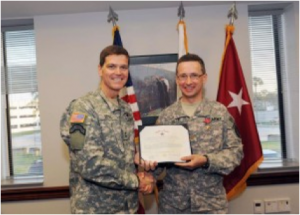 Choate’s wife, Tova Choate, posted on her Facebook page that Choate was the second special operations historian since 2001 to get a Bronze Star and the first Army reservist to receive one.
Choate’s wife, Tova Choate, posted on her Facebook page that Choate was the second special operations historian since 2001 to get a Bronze Star and the first Army reservist to receive one.
Back in the classroom, Choate plans to use this experience to teach world history. He’s worked with people from 34 countries; he’s now been to Asia, and he’s gotten a close and personal look at military history and strategy. He has a better understanding of what NATO does now, he said with a laugh.
Choate, who’s now at MacDill Air Force Base in Florida, said he’s looking forward to seeing his family again.
2013 Hi I’m Jane. I live in Scotland, I’m a wife, I’m a mother to three boys, I love teaching drama and I’m a Mormon. Posted to YouTube. Listen to her Scottish Brogue. http://www.mormon.org/janec
2016 . Brexit. Withdrawal of the United Kingdom from the European Union, or Brexit (a portmanteau of “British” and “exit” or “Britain” and “exit’’). The Electoral Commission announced the official “Remain” and “Leave” designated groups before the beginning of the official campaign period (on 13 April 2016) ahead of the deadline on 14 April 2016: Britain Stronger in Europe for “Remain” and Vote Leave for “Leave” the Political Parties, Elections and Referendums Act 2000, the Electoral Commission has the authority to designate and to provide funding for two official lead campaign groups, one for “Remain” and one for “Leave”. Each designated group has access to grants worth up to £600,000 as well as television spots and free leaflet drops. The Act declares that these designated group are not permitted to spend overall more than £7 million. The Act permits other campaign groups to participate but their overall spending is limited to a maximum of £700,000 if they are registered. Spending by unregistered groups is limited by the Act to a maximum of £10,000.’’ Wikipedia.
Analysis. The effect of spending limits is to put much more influence on newspapers who can editorialize or columnize without limit.
2016 Utah is ranked 2nd highest (4.6% of the state population) among the 50 United States with the top percentages of Scottish residents (Wikipedia 26 March 2017 https://en.wikipedia.org/wiki/Scottish_Americans#Scottish_Americans_by_state ). How are the Scots in Utah doing? United Health Foundation America’s health rankings Smoking (% of adults) Utah #1 2016 report. P. 134 http://assets.americashealthrankings.org/app/uploads/ahr16-complete-v2.pdf
Disclaimer: The author of each article published on this web site owns his or her own words. The opinions, beliefs and viewpoints expressed by the various authors and forum participants on this site do not necessarily reflect the opinions, beliefs and viewpoints of Utah Standard News or official policies of the USN and may actually reflect positions that USN actively opposes.
Utah Standard News depends on the support of readers like you.
Good Journalism requires time, expertise, passion and money. We know you appreciate the coverage here. Please help us to continue as an alternative news website by becoming a subscriber or making a donation. To learn more about our subscription options or make a donation, click here.
To Advertise on UtahStandardNews.com, please contact us at: ed@utahstandardnews.com.


Comments - No Responses to “April 13th Scots Book of Days”
Sure is empty down here...